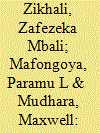| Srl | Item |
| 1 |
ID:
132046


|
|
|
|
|
| Publication |
2014.
|
| Summary/Abstract |
With rapid China now the world's second-largest economy, the status and Wrole of China's think tanks have become an increasing concern. On the whole, the international status of China' s think tanks is not
commensurate with the country' s current international status. The University of Pennsylvania' s The Global Go To Think Tanks Report published in 2014 said that as of August 2013, China had 426 think tanks, second only to the U.S. with 1,828. But of the top 100 non-U.,S. think tanks in the world only 5 are Chinese, and in the 150 most in?uential global think tanks, only 6 are from China-with the rest mostly from Europe. China' s think tanks lack professionalism and in?uence.' This is why China has been pushing to improve its think tanks internationally. In April 2013, President Xi Jinping proposed building a "new think tank with Chinese characteristics". To date this has been the clearest statement from a leader of China on think tanks? Decision of the CCCPC on Some Major Issues Conceming Comprehensively Deepening the Reform was passed in the 3rd Plenary Session of the 18th CPC Central Committee held in 2013. It clearly proposed"the building of new think tanks with Chinese characteristics and developing
a sound decision-making advisory system". China' s think tanks must make an international transition, but how can they do this'? What specific challenges are there? This paper will analyze these questions.
|
|
|
|
|
|
|
|
|
|
|
|
|
|
|
|
| 2 |
ID:
170540


|
|
|
|
|
| Summary/Abstract |
This study assessed the provision of informal training offered by the Limpopo Department of Agriculture, South Africa, to agricultural extension officers (AEOs). The study used surveyed 90 public extension officers purposively sampled. There were statistically significant differences in extension officers’ exposure to climate change between their education levels and in the provision of climate change training between extension officers’ work experience (P⩽0.05). The study concluded that the majority of AEOs have not been fully exposed to climate information prior to their employment. This suggests that the information gap in Agricultural Extension and Advisory Services (AEAS) stems from the slow mainstreaming and integration of climate change information.
|
|
|
|
|
|
|
|
|
|
|
|
|
|
|
|